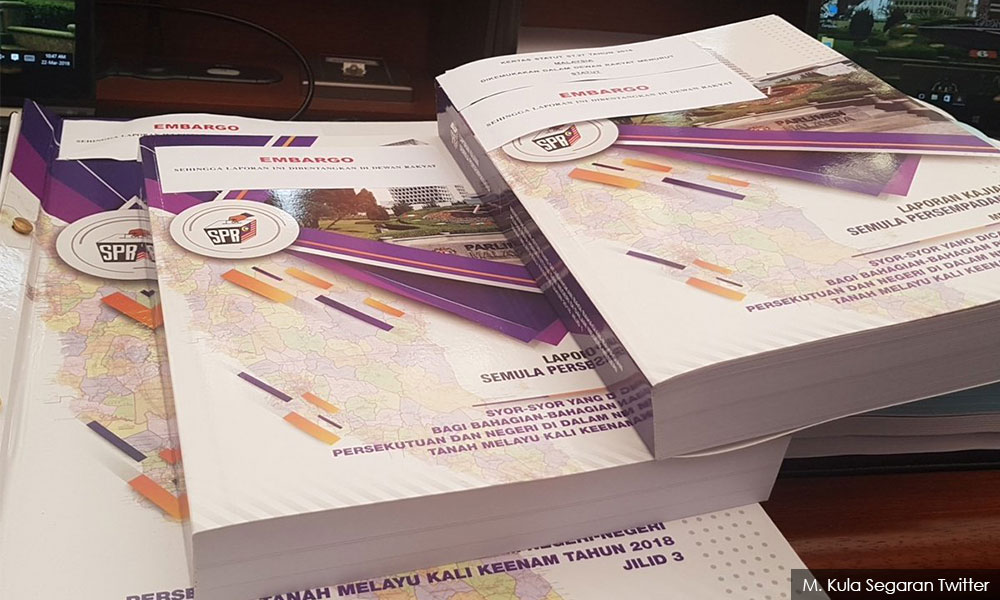COMMENT | Bersih is increasingly concerned by the prospect of unconstitutional and unfair boundaries being hastily and unlawfully passed through the Dewan Rakyat tomorrow.
While the final report remains under embargo, away from public scrutiny, the trends in both the first and second proposals by the Election Commission demonstrate their consistent failure to protect the principle of "one person, one vote, one value” and prevent gerrymandering.
Bersih believes there is clear evidence that, instead of following the conditions of the Thirteenth Schedule, the boundaries proposed in the first and second displays have been clearly redrawn to favour BN.
In the first display, based on voting patterns in the 13th general election, analysts have concluded that BN would win an additional six parliament seats (Kuala Nerus, Bukit Gantang, Lumut, Hulu Langat, Lembah Pantai and Bukit Katil). The opposition would not win any additional parliament seats.
BN would also have increased majorities in 11 marginal parliament seats, while the opposition would have increased majorities in just four marginal seats.
On the other hand, the opposition would have seen reduced majorities in eight marginal seats they won in 2013, with BN only having a reduced majority in one parliament seat.
At the state level, in the first display, Umno would have won six additional seats in Terengganu and seven more seats in Selangor. In Selangor, BN would also have seen higher majorities in six marginal constituencies.
If, on the other hand, the second display proposals are passed without changes, BN will enjoy a swing of three parliament seats without any changes in votes from GE13. Umno would win Bukit Gantang from PAS and Bukit Katil from PKR, while MCA would win Lumut from PKR.
Five marginal parliament seats that were won by BN would now enjoy higher majorities. Majorities would significantly increase in Hulu Selangor (held by MIC), Muar and Pulai (held by Umno.
Slight increases in majorities would be seen by Umno in Sungai Besar and Ketereh. No parliament seats held by the opposition experience an increase in vote majorities.
Six marginal parliament seats that were won by Pakatan Rakyat would suffer from decreased majorities. Majorities would significantly decrease in Gombak (PKR), Wangsa Maju (PKR) and Lembah Pantai (PKR).
Slight reductions in majorities would be seen in Kuala Kedah (PAS), Kuala Nerus (PAS) and Dungun (PAS). No marginal seats held by BN experience a decrease in vote majorities.
For state constituencies, Kedah and Selangor would have three seats swing in favour of BN, while Johor would have two seats swing to BN.

Some seats see huge swings in vote percentages towards BN, in order for them to win the seat, for example, Bachang, in Malacca, has a swing of 11.7%, while Pekan Nanas, in Johor, would have a swing of 9.5 percent.
Ignoring constitutional principles
If the principles of the Federal Constitution had been adhered to, the above political outcomes could be explained by “unintended consequences”. However, in both the first and second displays, there has been no concerted effort to reduce malapportionment and maintain local ties.
In the first display, seats such as Petaling Jaya Utara in Selangor were increased in size to over 150,000 voters, while Sabak Bernam remained at just 37,000 voters.
In Perak, Tambun was already oversized, but more voters were added to the seat so it had over 96,000 voters. The nearby constituency of Padang Rengas, on the other hand, had under 29,000 voters.
In the second display, while many changes were reversed, malapportionment was still seen throughout the country. In Gelang Patah, Johor, it was worsened to the extent that the seat would have over 119,000 voters, compared to the state average of 63,428.
In Malacca, Kota Melaka grew from 86,000 voters to over 117,000 voters in the second display.
The EC has also shown blatant disregard for local ties, another condition in the Federal Constitution, in both the first and second displays. Seats continued to criss-cross local authority boundaries throughout the country, making the work of elected representatives and local councils much more difficult.
In Selangor, for instance, Batu Tiga crosses across three local authorities in both the first and second displays; Majlis Perbandaran Klang, Majlis Bandaraya Shah Alam and Majlis Perbandaran Subang Jaya.
In Kelantan, in the second display, three state seats (Salor, Pasir Tumboh, Demit) all cross over the boundary of Majlis Perbandaran Kota Bahru and Majlis Daerah Ketereh.
GE14 decided by default?
Given the EC’s disregard for constitutional provisions, the only conclusion that can be drawn is that these boundaries are politically motivated in order to give BN a greater chance of victory in the GE14 and to win back Selangor.
In fact, if voter turnout is lower than GE13, given the increased vulnerability of opposition-held marginal seats, it is likely BN will win a two-thirds majority in Parliament just by manipulating these electoral boundaries.
More concerning is the high chance that the boundaries presented to Parliament will have been redrawn in a way that makes the political impact even more favourable to BN than the first display.
Bersih, therefore, urges all members of Parliament to reject the report laid before them on Wednesday if the trends observed in both the First and Second proposals by the EC are apparent.
BERSIH is a coalition of NGOs which seeks electoral system reform towards free, clean and fair elections.
The views expressed here are those of the author/contributor and do not necessarily represent the views of Malaysiakini.

